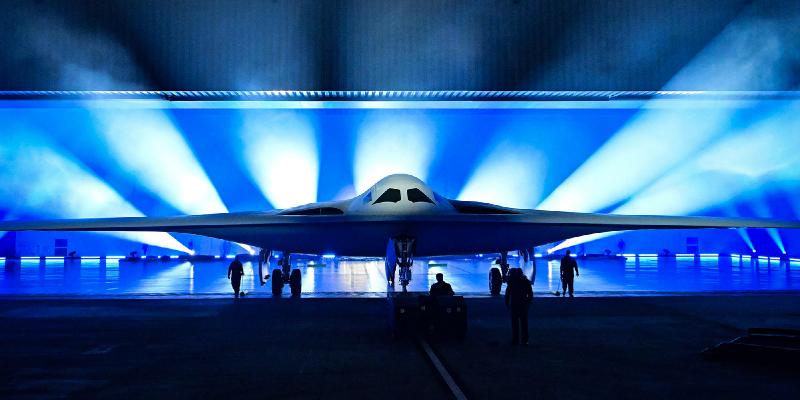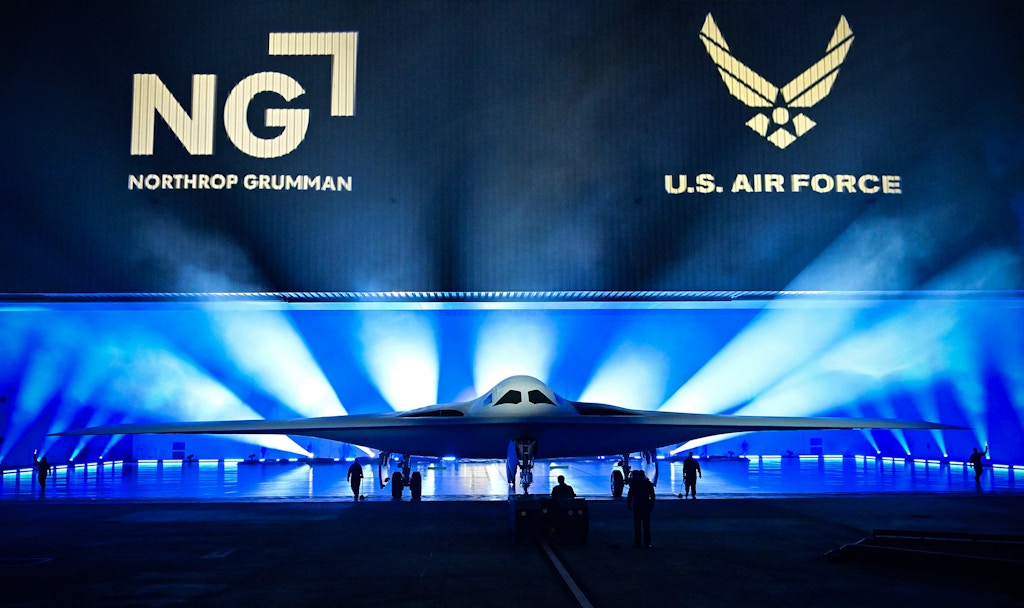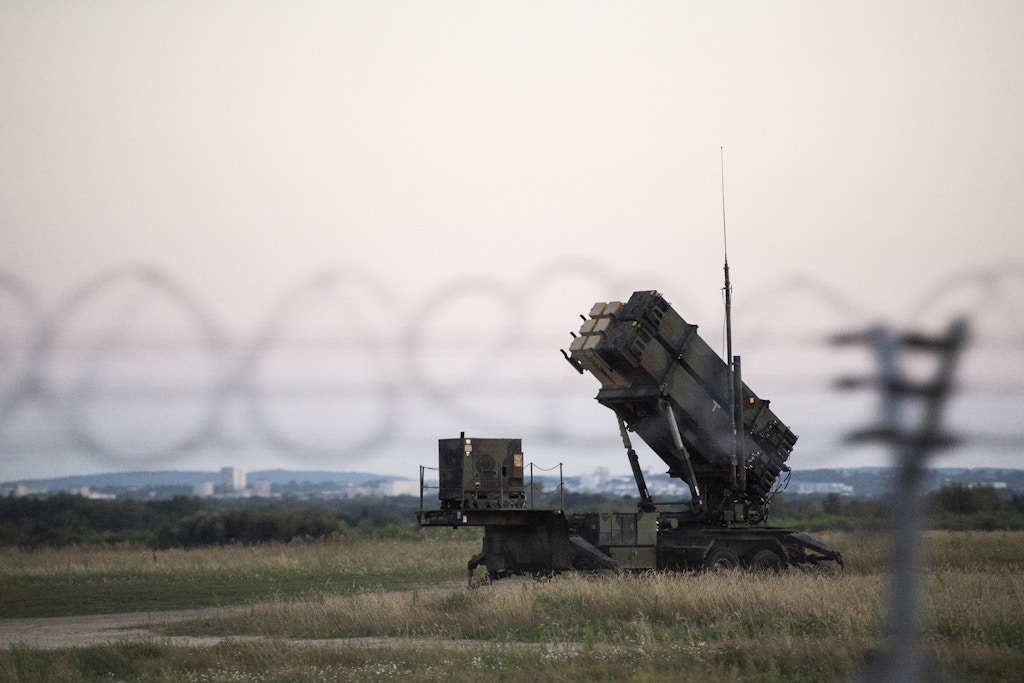The War Caucus Always Wins



The new $857 billion defense bill lines the pockets of contractors and pushes the U.S. toward a new Cold War.
Jeremy Scahill
December 7 2022, 7:38 p.m.

The B-21 Raider is unveiled during a ceremony at Northrop Grumman's Air Force Plant 42 in Palmdale, Calif., on Dec. 2, 2022. The high-tech stealth bomber can carry nuclear and conventional weapons; it's designed to be able to fly without a crew on board and is on track to cost nearly $700 million per plane.
Photo: Frederic J. Brown/AFP via Getty Images
The dominant political story emanating from Washington, D.C., these days centers around the battles between the Trumpist movement and the bipartisan "adults in the room" caucus — the Democratic Party and fragments of the Republican Party consisting of lawmakers and politicians who have affirmed the legitimacy of President Joe Biden's 2020 election victory. Often obscured by the media focus on this clash is the enduring influence of a long-standing faction of the U.S. power structure: the bipartisan war caucus. Throughout the Trump and Biden administrations, the U.S. has been on an escalating trajectory toward a new Cold War featuring the prime adversaries from the original, Russia and China. The ratcheted-up rhetoric from U.S. politicians — combined with Russia's invasion of Ukraine, the tensions between China and Taiwan, and Beijing's major advancements and investments in weapons systems and war technology — has heralded a bonanza for the defense industry.
Congress will soon vote on a record-shattering $857 billion defense spending bill that authorizes $45 billion more than Biden requested. Included in the National Defense Authorization Act of 2023, finalized on December 6, is the establishment of a multiyear no-bid contract system through which Lockheed Martin, Raytheon, Boeing, and other weapons manufacturers are being empowered to expand their "industrial base" and business. Lawmakers determined that "providing multi-year procurement authority for certain munitions programs is essential," in part because it will "provide the defense industrial base with predictable production opportunities and firm contractual commitments" to "increase and expand defense industrial capacity."
The NDAA authorizes $800 million in new military aid to Ukraine, which is separate from the supplemental funding measures the U.S. has implemented since Russia's invasion. The unprecedented flow of weapons to Ukraine has included a substantial transfer of weapons from the U.S. stockpile, amounting to approximately $10 billion worth of weapons. U.S. lawmakers have used this fact to push for expanding the scope of not only weapons procurements to "replenish" the arsenal, but also to maintain the pipeline of weapons to Ukraine and European-allied nations through at least the end of 2024. The defense industry position is that such multiyear acquisitions are preferable to emergency surge-demand scenarios, in part because such contracts allow for a long-term expansion of production facilities and increased workforce. It appears that Congress is heading in that direction.
On November 30, the Pentagon announced that the U.S. Army had awarded a $1.2 billion contract to Raytheon to produce six National Advanced Surface-to-Air Missile Systems "in support of the efforts in Ukraine." The estimated completion date was listed as November 2025. The next day, the Defense Department announced a $431 million contract for Lockheed to produce M142 High Mobility Artillery Rocket System launchers to replenish those transferred to Kyiv. In November, Lockheed also received a $521 million contract to resupply the Guided Multiple Launch Rocket Systems given to Ukraine.
The lion's share of major defense contracts goes to a handful of companies: Lockheed Martin, Raytheon, Boeing, General Dynamics, and Northrop Grumman. The Pentagon routinely engages in no-bid contracts or awards contracts that are, by default, single-bid contracts. What lawmakers are seeking to do with the 2023 National Defense Authorization Act, however, is to extend that practice to the refilling of weapons stockpiles. The legislation would empower the Pentagon to engage in no-bid contracts to replenish arms supplies if the weapons were transferred "in response to an armed attack by a foreign adversary of the United States." While the legislation specifically refers to Russia's invasion of Ukraine, it could also apply to officially designated adversaries such as China, Iran, Cuba, or North Korea. The NDAA authorizes more than $2.7 billion in new funds to "boost munitions production capacity." Undersecretary of Defense for Acquisition and Sustainment William LaPlante recently said the Pentagon has already put into contract $4 billion worth of deals "to replenish our inventories of equipment we have sent to Ukraine."
The war industry is clearly elated. "We spend a lot of money on some very exquisite large systems and we do not spend as much on the munitions necessary to support those," said Raytheon's CEO Gregory Hayes at the recent Reagan National Defense Forum. "We have not had a priority on fulfilling the war reserves that we need to fight a long-term battle." Politico reported that discussions at the forum, which featured defense company CEOs, members of Congress, and U.S. military officials, identified China as the greatest "long-term threat." But the China focus "was eclipsed by the need to kick into much higher gear to tackle a problem that many here didn't imagine just a year ago: a hot proxy war with Russia in Ukraine that has sent the Pentagon and the defense industry scrambling." Noting recent moves by Congress to increase munitions production, the U.S. Army's top weapons buyer, Doug Bush, said, "I think we're closer to a wartime mode, which has been something I've been working on to build."
In pushing their case for expanding the weapons acquisitions process, some lawmakers are striking somber notes about the danger of depleting the U.S. arsenal. "Our nation's ability to defend itself should never suffer because of bureaucratic policies and red tape," declared Sen. Marco Rubio, R-Fla. "As the United States continues to lead the global military aid response to Ukraine amid Putin's unprovoked war, it has become increasingly critical that we simultaneously ensure the sustainment of our defensive weapons stockpile while also providing the materials our allies and partners need to defend themselves," said Sen. Jeanne Shaheen, D-N.H., who spearheaded the no-bid procurement legislation. Sen. Thom Tillis, R-N.C., asserted that the "lethal aid provided to Ukraine has diminished U.S. stockpiles and left defense contractors with uncertainty on timing and orders for backfill, negatively affecting their ability to quickly ramp up production." Sen. John Cornyn, R-Texas, said the legislation would ensure that "helping our allies and partners doesn't diminish our ability to protect ourselves."
There is no actual shortage of defensive weapons in the U.S.
This rhetoric is largely a parlor game. There is no actual shortage of defensive weapons in the U.S. The "stockpile" is based on U.S. war-gaming theory and preparation for various imagined future wars and simultaneous campaigns. Ultimately, this NDAA would represent the latest narrative triumph for the hawks who falsely complained that Bill Clinton and the Democrats had gravely endangered America by "gutting" defense spending in the 1990s. Declaring war against the threats posed by nation states like Russia and China is a far better vehicle to sell large-scale defense spending than Osama bin Laden or the Islamic State group, in part because it justifies massive expenditures on the most expensive weapons systems.
While Russia's invasion of Ukraine remains a central focus, the appetite for countering China's own expansive weapons and technology development is on track to grow for years to come. The 2023 NDAA expands military support for Taiwan with a five-year package worth up to $10 billion in financing to purchase U.S. weapons, as well as a contingency fund of up to $100 million a year through 2032 to maintain a munitions stockpile. It also provides for running "wargames that allow operational commands to improve joint and combined war planning for contingencies involving a well-equipped adversary in a counter-intervention campaign" and exercises that "develop the lethality and survivability of combined forces against" China. Under the NDAA, the Pentagon would develop a plan "to expedite military assistance to Taiwan in the event of a crisis or conflict." All of this is aimed at maintaining "the capacity of the United States to resist a fait accompli that would jeopardize the security of the people on Taiwan" by deterring China from using force to "invade and seize control of Taiwan before the United States can respond effectively."
Since taking office, Biden has stewarded the multi-administration expansion of U.S. arms sales to Taiwan. In September, he approved a new round of more than $1 billion in weapons, the largest authorization Biden has made since taking office. In its October 12 National Security Strategy, the White House claimed that "Russia's strategic limitations have been exposed following its war of aggression against Ukraine" and designated China as "the only competitor with both the intent to reshape the international order and, increasingly, the economic, diplomatic, military, and technological power to advance that objective." It asserted that China "presents America's most consequential geopolitical challenge." While noting that "Russia poses an immediate and ongoing threat to the regional security order in Europe and it is a source of disruption and instability globally," the White House report said Russia "lacks the across the spectrum capabilities of" China.
"This Isn't Just Another Airplane"
On the evening of Friday, December 2, in a ceremony attended by senior U.S. officials, members of Congress, and industry executives, Northrop Grumman unveiled the Pentagon's next-generation nuclear-capable strategic bomber, the B-21 Raider. The first new stealth bomber produced in more than 30 years, the Raider "will form the backbone of the future Air Force bomber force." The $700 million bat-winged aircraft will be capable of both manned and unmanned operations, and a first flight is scheduled for 2023. The Pentagon reportedly plans to build at least 100 of the warplanes, with an estimated cost of $32 billion, including research and development, through 2027.
Defense Secretary Lloyd Austin spoke with an almost religious reverence for the nuclear bomber as a large tarp was pulled from its body in a sort of baptismal ceremony at Air Force Plant 42 in Palmdale, California. "This isn't just another airplane. It's not just another acquisition. It is a symbol and a source of the fighting spirit that President Reagan spoke of," Austin said. "It's the embodiment of America's determination to defend the republic that we all love." He declared that "50 years of advances in low-observable technology have gone into this aircraft. Even the most sophisticated air defense systems will struggle to detect a B-21 in the sky," adding, "This bomber will be able to defend our country with new weapons that haven't even been invented yet." Prior to his nomination to be defense secretary, Austin served on the board of Raytheon.

MIM-104 Patriot short-range anti-aircraft missile systems produced by Raytheon, located at Rzeszow Airport, close to the Ukraine border on July 24, 2022 in Poland.
Photo: Christophe Gateau/picture-alliance/dpa/AP
Russian President Vladimir Putin should be given some scraps of credit for aiding the U.S. war party. His decision to invade Ukraine helped obliterate the (admittedly paltry) roadblocks to even more massive payouts to war corporations. For many D.C. politicians, the Ukraine war is not just the U.S. coming to the aid of a victim of aggression by a U.S. adversary; the endeavor also emits a strong scent of domestic political dynamics involving Donald Trump and the allegations that his 2016 election was part of a Russian Manchurian candidate operation. With Republicans taking control of the House of Representatives in January, it seems that all these factors will begin to converge in a carnival of congressional hearings. Presumptive House Speaker Kevin McCarthy has pledged to bring oversight to Ukraine expenditures. But when pressed, he has made clear that his promise to end the "blank check" for Ukraine does not alter his fundamental support for arming and aiding Kyiv.
For months, Trumpist political figures in the House, led by Georgia Rep. Marjorie Taylor Greene, have been pushing legislation to "audit" the Ukraine aid spending. While it is difficult to take Greene seriously for a volcanic flow of reasons, including her own purchase of as much as $15,000 in Lockheed Martin stock two days before the Russian invasion in February, there is a reasonable case to make for investigating the money being spent, the weapons flowing to Kyiv, and who is ultimately benefiting. "As of early November, U.S. monitors had performed just two in-person inspections since the war began in February — accounting for about 10 percent of the 22,000 U.S.-provided weapons," according to the Washington Post. The Biden administration, the paper reported, has said it does not want to send inspectors to the front lines in Ukraine because the inspectors would likely require armed guards, potentially creating "a situation that risks being interpreted by the Kremlin as direct American involvement in the war."
On Tuesday, Greene's resolution, which would have required the Biden administration to hand over all documents related to Ukraine spending within 14 days, failed to pass the Democrat-controlled House Foreign Affairs Committee. Democrats, who united to block the proposal, portrayed the resolution as undermining the war effort against Russia. "This is not the time for us to be divided," said New York Rep. Gregory Meeks, the Democratic chair of the committee. "We've held together with NATO and the E.U. and our allies. Let's not fall into this trap." While the loudest opponents of Ukraine aid on Capitol Hill have been far-right Republicans — many but not all aligned with Trump — Greene's resolution showed that more mainstream Republicans are getting on board the audit train ahead of January when the GOP takes control of the House. Most Republicans support Biden's Ukraine weapons transfers, with some saying they would back a Ukraine audit "because it did not claw back any current or future funding for Ukraine."
Rep. Jason Crow, D-Colo., a supporter of the Ukraine war cause, led a successful bipartisan effort to include some oversight provisions in the NDAA. The bill would require the Pentagon's inspector general to report to Congress any and all efforts to oversee and track the weapons and other aid delivered to Ukraine. The Senate Armed Services Committee described the authority in the bill as requiring "a report on the framework the Inspectors General have adopted to oversee U.S. assistance to Ukraine and whether there are any gaps in oversight or funding for such activities." It requires the inspector general by next March to present congressional defense committees "with a comprehensive briefing on the status and findings of Inspector General oversight, reviews, audits, and inspections of the activities conducted by the Department of Defense responds [sic] to Russia's further invasion of Ukraine."
Throughout the year, Republican Sen. Rand Paul of Kentucky has been pushing for a special inspector general to oversee Ukraine spending and temporarily delayed a Ukraine spending measure in May to prove his point. "You shouldn't shove all $40 billion out the door without any oversight," Paul said. "And having a special inspector general, we did it in Afghanistan — it didn't stop all the waste — it at least makes the thieves think twice about stealing the money." In May, 57 House Republicans and 11 Senate Republicans voted against the Ukraine spending bill. No Democrats voted against the measure.
The Biden White House has shown no sign of pumping the brakes on Ukraine spending and arms transfers. Biden also has made clear he intends to push ahead with the aggressive U.S. military buildup in preparation for future conflict with China, a position with widespread backing across the aisle. With a divided Congress, the 2024 elections looming, and the Trump question hovering over it all, a lot of the Democrats' legislative agenda will be tough to implement after the new year. But the short and long-term future looks bright for the Russia and China hawks, the defense industry, and its Democratic and Republican patrons on Capitol Hill. On these matters, bipartisanship remains alive and well. The House could vote on the NDAA as soon as this week, and the Senate is expected to swiftly follow suit to get the bill to Biden's desk.





The media does a wonderful job convincing you that you have to support war. Even our politicians who speak against it, bet and bank on it. The Neocons are entrenched in both of the major political parties and it doesn't appear to be changing any time soon.
The Military Industrial complex, Democrats and Republicans do not serve us well.
I was just thinking today that it feels like the Cold War of the 70's and 80's. I don't remember the 50's and 60's since I was born in 1962
I remember all since I was born in the early 50's and served 20 years in the Navy from 1973 through 1993 that included two wars on two continents and I shed blood on each. I, like others, have seen elements of the Cold War that did get pretty warm and saw lives lost as a result.
I am a little torn. I know we need to safeguard ourselves yet a lot of it seems to be just keeping the military industrial complex chugging along.
Just chugging along?
Article edited to reflect its updated title.